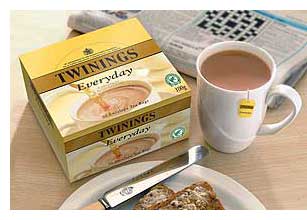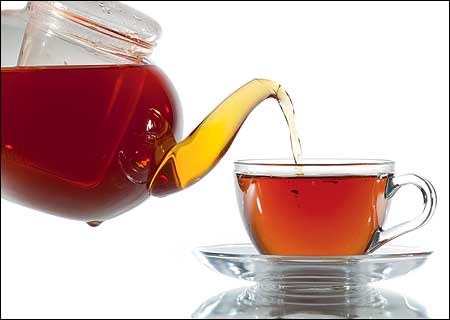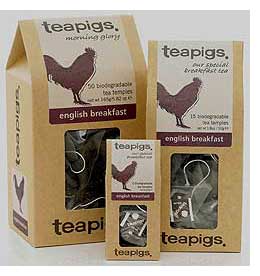Inside Beverages – The myth of the standard cuppa
The standard everyday cuppa is considered a British catering classic, but it's a red herring, because there is no such thing. Ian Boughton reports
Every tea menu has to have a ‘standard' tea on it, to be drunk with milk in the British way. This is likely to be an English Breakfast, but all teas are not the same, and not even all English Breakfast teas are the same, which means that the caterer looking to serve a standard cuppa has decisions to make. It is possible to choose a great everyday cuppa, and it is possible to choose an awful one. And they may both be called English Breakfast.
Tea remains an area of great potential for the hospitality trade. Even the beverage trade's annual show, Caffe Culture, has now announced a concentration on tea for this year's event, to widespread approval.
However, the great hurdle to be overcome is the image of ‘the humble cup of tea' when tea should really be regarded as a star profit-maker on any caterer's menu. The hazard of buying tea is that so many illusions abound. One is that the British consumer judges his or her tea by colour, typically by that shade of brown that is considered to be the ‘proper' cuppa with milk. However, because the kind of dust (an acceptable tea-trade term) found in a cheap teabag gives up its colour faster than a high-grade full leaf, the consumer is visually satisfied by the look of lesser-quality teas.
A famous argument from giant brands is that their teas always taste the same because the customer expects what they know and love. To achieve this, their blenders keep adjusting the blend according to what tea is available, while aiming for the familiar taste.
"As each tea estate produces relatively small quantities each week, and as the quality of the tea changes with the weather, it is the blender's job to find the right combination of teas to ensure that the blend remains constant," explains Peter Haigh, brand development manager at Tetley.
"The list of things that need to be calibrated include the sparkle, the colour, the thickness, the taste, and the leaf size. Only when all these have come together are we able to produce the tea that is always available and always delivers the same great taste."
No it doesn't, say the smaller brands. "The big brands rely on the powers of marketing," says Paul Marsh, managing director of Somerset tea blender DJ Miles, a brand familiar throughout the West Country hotel trade. "Yes, they will say they achieve consistency of taste, but they cannot. We taste their teas every week, and we see noticeable changes.
"As an example, the quality period for Assam tea is June-July and a bit of August. The best of it runs out very quickly, and no big company could possibly hold a year's supply of the same Assam. So their tea does vary, irrespective of what they say. It may be the same colour, but not the same taste.
"Does the average consumer notice? I think so - but they are swayed by marketing power to accept it."
Although all English Breakfast blends are different, they begin from the same basis. The essential ingredients of the classic breakfast tea are an Indian, an African, and a Ceylon. The Assam is strong and rich, the Ceylon gives some subtlety of taste, and Kenyan teas are usually included for power.
It should be called Scottish Breakfast, says Ed Berry, marketing director at Newby Teas, because Queen Victoria first tasted it at Balmoral, and brought it to London, where the fashionable tea shops renamed it. (Legend says the blend was created by Drysdale, possibly one of the first partners in the brand, which is now Brodies of Edinburgh).
Newby has devised a lighter version, the Indian Breakfast, which combines Assam, Darjeeling and Himalayan, all geographically near neighbours.
"This is unusual, as most breakfast teas contain some African. The delicate Darjeeling gives a less in-your-face tannic hit, for character without a big punch. It is of medium strength and fruit aromas prevail. For the caterer, the choice is whether to settle for a basic product, or to provide something where your customer leaves having enjoyed something special. You can certainly create a reputation for serving a better breakfast tea."
The question is how a caterer chooses between versions of a ‘standard' tea.
"There is a good reason behind the most obvious answer, ‘taste it'," says Marco Olmi, managing director for Drury Tea and Coffee. "Not all British water is the same, which is why we have half a dozen English Breakfasts.
"Our No 10 is Assam and Kenyan, higher in Assam, which is generally regarded as the better quality tea. One variation on that is our No 8, which is a ‘traditional English' with more Kenyan, so the result is slightly less subtle, with more oomph. Then our No 2 is our Superior London Blend, which has even more Kenyan, and tilts the balance further.
"Quite a few restaurants take our blend which is large-leaf Ceylon and Kenyan, lighter and less powerful than an in-your-face English Breakfast."
"In London, we have widely differing waters, which affect teas in different ways. So, if your restaurant is in west London, don't do your tasting in east London! Always do your final tasting on your own site."
Regional tastes also affect the balance of blends. The heartiest ‘everyday cuppa' of all is Irish Breakfast. Suki Teas offer a Belfast Brew which is 60% Assam and 40% Tanzanian, a strong and fruity mixture.
A big argument rages over what customers want from a ‘standard cuppa'. Again, the big brands argue familiarity of taste, whereas their opponents protest that the customer is not happy to be charged £2 for a cup with a string tag bearing a brand name they know they can buy in the supermarket.
Not so, says Jacqueline Comeau, customer marketing manager at Twinings.
"In retail, commodity teas such as builders' blends are in a 2.7% volume decline, whereas premium offerings including Twinings Everyday are seeing a 5.2% volume increase. The demand for speciality mainstream blends has been driven by the premium offerings consumers experience out of home in hotels, restaurants and tea bars and this is creating a change in the way consumers evaluate the experience of a good quality cuppa. To believe that all ‘everyday' tea is the same would mean missing out on a great profit opportunity."
Only partial agreement comes from Bill Gorman, chief executive of the Tea Council, who pointedly tells the hospitality trade that "the reason that people are disinclined to take tea out-of-home is because they can brew it better at home."
Nevertheless, he says, tea works if it is taken seriously. "It remains a no-brainer - seven out of 10 Brits will have at least one cup of tea today, whereas only four will have a coffee. There is a statistical argument to a product which, if presented properly, offers a far more attractive profitability than coffee."
And proper presentation brings another illusion, says Paul Marsh at DJ Miles - the belief that bags are cheaper than loose tea.
"Real economies are being found by hotels who choose loose tea and make it carefully, giving a better infusion and a more rounded cup of tea. This is far more cost-effective than leaving it to staff who think they just have to put two teabags in a teapot - they don't care about your costs. Quality is more economical, there's no doubt about it."
Agreement comes from an unexpected source: Teapigs, the company which pioneered the ‘tea temple', the pyramid-shaped item which allows large-leaf tea to be brewed in a bag. The loose form of Teapigs breakfast tea, ‘a skilful balancing act between a gutsy Assam, a mellow little Ceylon and a powerful Rwanda', is one-third of the price of the bag version.
However, bagged tea continues to be regarded as ‘the proper cuppa' by some catering businesses, notably the new Breadbox chain, from the travel-catering giant SSP, which has decided to promote a ‘proper cuppa in a proper teapot'. It turns out to be one of the most familiar bagged blends - five PG Tips teabags in 5.5 pints of water, allowed to brew for three minutes.
Contacts
http://www.twiningsfs.co.uk" target="_blank" rel="noreferrer">DJ Miles](http://www.djmiles.co.uk) 0800 387948
[Drury ](http://www.drury.uk.com)0207 740 1100
Newby 0207 251 8939
Suki 028 9033 0938
[Tea Council ](http://www.tea.co.uk)020 7371 7787
Teapigs 020 8568 8989
[Tetley](http://www.teaexperts.co.uk) 0800 387227
[Twinings 01264 348181













